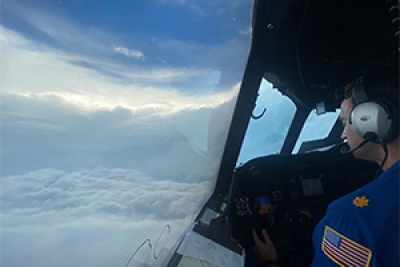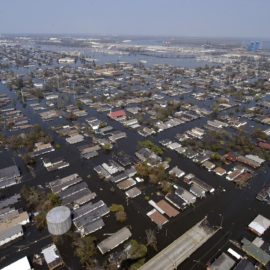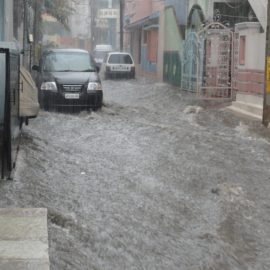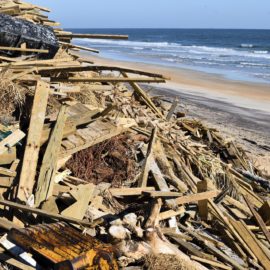
When we lived in Miami one of our friends was a NOAA hurricane hunter. They are here now to offer some advice.
The nation’s Hurricane Hunters showed up in New Orleans on Tuesday and issued advice ahead of the June 1 start of tropical storm season, part of a tour across the Gulf states for Hurricane Preparedness Week. The National Oceanic and Atmospheric Administration hunts hurricanes with WP-3D Orion planes, which were specially crafted for that purpose in the ’70s. The aircraft that landed at New Orleans’ Lakefront Airport has been through 107 hurricanes since then, including Anita, Gustav and Ida. The plane hasn’t changed much since it was built, except for the floors being reinforced to carry research equipment and the tail being fitted with a doppler radar. The plane usually carries a team of 12-15, including pilots, flight engineers and weather experts. NOAA has two WP-3Ds, and uses them to monitor storms for 24-hour coverage, flying 10,000 feet above sea level.
nola.com
It is a busy trip once they get to the site.
When they enter the hurricane, flight engineers will drop 20-30 GPS dropsonde devices, which track air pressure, humidity, wind speed and wind direction. The tail doppler radar also maps the hurricane from the inside, and the plane is outfitted with a Stepped-Frequency Microwave Radiometer to measure wind speeds on the ocean’s surface. Scientists on-board send all information they collect to the NHC instantaneously. The Air Force also uses its WJ-130J aircraft to track tropical storms using the same methods. However, the Air Force has 10 of these planes on standby to send into storms. The National Hurricane Center’s new director, Michael Brennan, said officials wanted to stress that, regardless of the season’s activity, it just takes one hurricane to cause life-changing damage. “In terms of preparedness, people need to know their risks and know where you live know if you live in a storm surge evacuation zone. Know if you might be asked to leave your home during a storm because that forms the basis of your home preparedness plan,” said Brennan.
FEMA was one of the attendees and they laid out what they do.
FEMA’s Deputy Associate Administrator for Response and Recovery Keith Turi said that, in the case of a hurricane making landfall, the agency will pre-position search-and-rescue teams and any resources needed for people who may need to seek shelter. “We will work with the state and with our partners, like the American Red Cross, to provide shelter, food, commodities for people if they have to evacuate due to flood or if they’re out of power and need somewhere to go,” Turi said. “We have strong partnerships with the local utilities to try and help facilitate power getting back on as quickly as possible.” Turi said that residents should be aware of the threats specific to their area in order to make a plan for evacuation or sheltering in place. He urged residents to tune in to local emergency alerts instead of letting past experiences dictate what they do. If a hurricane does cause major damage, FEMA is also able to help with some of the financial burden residents might face. “If a storm’s impacts are significant enough that the presidential disaster declaration is declared, then we can provide assistance for uninsured losses, for temporary housing, for personal property and for housing repair,” Turi said. “I will say, it doesn’t cover everything. insurance is still the best way.” Residents can use the FEMA app to check for local emergency alerts. They can also use the app or call FEMA’s offices to file for assistance if they’ve been impacted by a disastrous hurricane.
They fly through it we endure it on the ground.
The Hurricane Hunters hope that, by monitoring potential hurricanes, they can help inform people’s decisions in an emergency. “You never know what you’re going to get. Even if it’s a quiet season, one storm can disrupt many, many lives, a lot of property,” said Adam Abitbol, the NOAA Aircraft Operations Center’s operations chief. “We all find the job very rewarding as we understand we could ultimately help protect lives and property.”
Definitely a good service to the country. The Coast Guard handles NOAA retirees.



